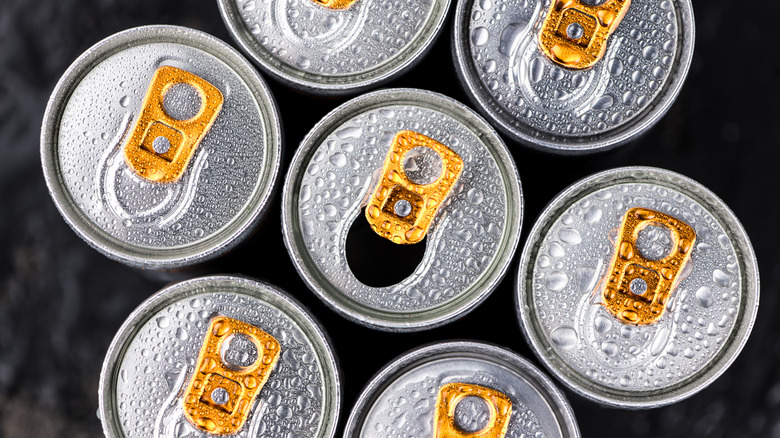Is Your Favorite Energy Drink Damaging Your Heart?
Take a peek at any vending machine or browse the packaged drinks section of your local supermarket and you'll inevitably find shiny, often brightly colored cans of energy drinks. According to Globe Newswire, the energy drink market is thriving, valued at $46 billion in 2021 and expected to swell to over $108 billion by 2028. You've likely sipped these products at some point to recharge before a workout, stay awake after a night of poor sleep, or power through a long workday.
What sets energy drinks apart from most other canned drinks — namely soda — is their high levels of caffeine. A 2017 study published in Frontiers in Public Health explained that while the caffeine content in soda is regulated in the U.S., most energy drinks are able to sidestep caffeine limits. That's why you might find some of these beverages containing as much caffeine as two cups of coffee (per Harvard T.H. Chan School of Public Health).
Energy drinks also stand out for their added sweeteners and other supplementary ingredients. According to Eating Well, these often include ginseng, B vitamins, taurine, guarana, and tea extracts.
Chugging a can might seem relatively harmless to your health. However, regularly consuming energy drinks might be wreaking havoc on your heart.
The link between energy drinks and heart disease
Heart disease is the number one cause of death among American adults, reports the Centers for Disease Control and Prevention. While energy drinks alone aren't responsible for heart issues, they might hurt your chances of improving heart health.
A 2019 study published in the Journal of the American Heart Association asserted that energy drinks are associated with heart attacks and other cardiac emergencies. Furthermore, the study found that drinking these beverages causes an irregular heartbeat and high blood pressure. Additional research suggests that not only caffeine, but other additives, such as taurine, found in energy drinks contribute to heart conditions (per Science Daily).
Finally, anecdotal evidence suggests that drinking energy drinks could lead to heart failure, even in young people. A 2021 case report published in BMJ detailed a 21-year-old patient who suffered from heart failure after excessively drinking energy beverages. The man had no medical history or other health conditions that predisposed him to heart problems, serving as a reminder that anyone could suffer similar consequences.
Though multiple ingredients can make energy drinks unhealthy, a good way to start protecting your health is by limiting your daily caffeine intake. Scan the label of your favorite drink, and make sure to not exceed 400 milligrams of caffeine per day, Mayo Clinic recommends. Also, occasionally swap energy drinks for other heart-healthy refreshments such as matcha tea, coffee, low-sugar hot chocolate, or citrus juice (per Healthline).


